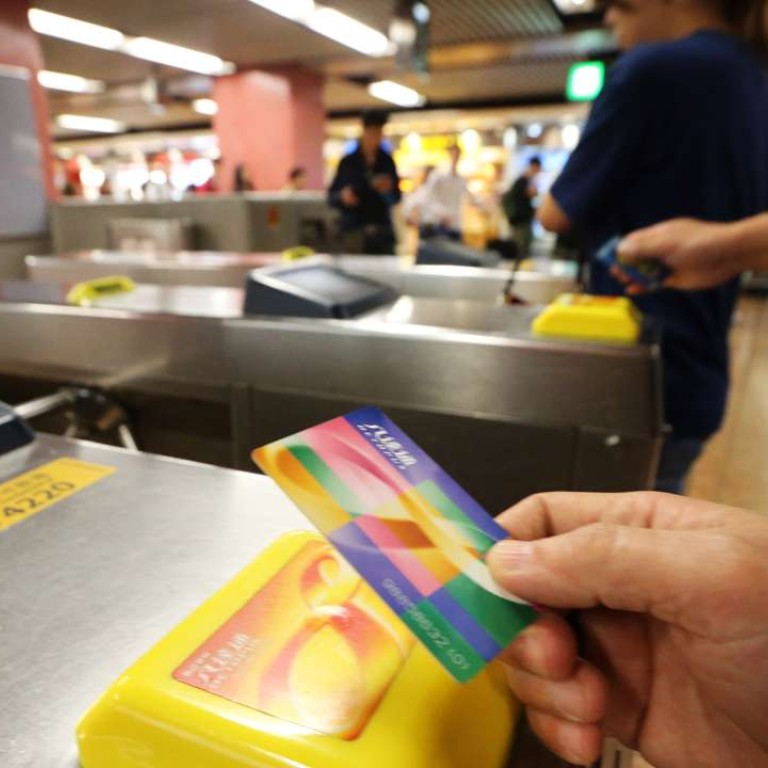
Paying by mobile phone? New payment apps are gearing up to disrupt Octopus Card, traditional cheque writing
Mobile payment and digital wallet start-ups in Hong Kong are aiming to convert residents from their reliance on Octopus cards and cheques in a bid to bring the city in line with trends in mainland China as Apple’s Apple Pay is set to launch in the city.
Alex Kong, founder of mobile wallet TNG, which lets users pay for goods in shops, transfer money to friends and settle taxi fares, said payment options in Hong Kong haven’t evolved much since Octopus was introduced in 1997.
“Hong Kong should step forward and embrace the change. We are already here and we are very advanced but Hong Kong people are very careful on financial matters,” Kong said.
“This will propel Hong Kong into a [financial technology] hub. Nineteen years ago, we had octopus as a showcase and hopefully today we can be another showcase to the world.”
Mobile transactions in China hit US$235 billion last year, more than double the previous year, led by Alibaba’s Alipay and Tencent’s WeChat Pay, according to Euromonitor International, yet options remain limited in Hong Kong.
Alibaba Group owns the South China Morning Post.
Adoption of mobile wallets in Hong Kong has room to grow. A survey of 750 Hong Kong people by Visa in May found 78 per cent would be likely to use their smartphones for daily payments if such services were available.
TNG was launched in November and now has 300,000 users, an average top-up amount of HK$145 and average transaction value of HK$66, a figure Kong says is in keeping with the company’s plan to target micro transactions.

Kong said TNG’s target market is different to that of Apple’s Apple Pay, which is set to launch its mobile payment service in Hong Kong in the coming months, as Apple’s service targets credit card users and stores with contactless payment terminals.
Shops and cab drivers are issued with unique QR codes by TNG which are then scanned by users to pay meaning they do not need to install expensive payment terminals.
TNG’s future plans include allowing users to pay for bus and minibus rides, Kong said, adding that users can now transfer money from their wallets to their bank accounts.
TNG has applied for a license under the stored-value facility regulations overseen by the Hong Kong Monetary Authority, however many view the capital requirement of HK$25 million as a barrier for start-ups.
Peer-to-peer payment app Smart Transfer founded by former bankers Francis Lu and Ajeesh Sadanand was launched in May. The app allows users to transfer money to friends, family or others, with the goal of disrupting the cheque as a medium for small payment transactions.
More than 150 million cheques are written each year in Hong Kong, according to the HKMA, compared to 650 million issued in the United Kingdom in 2014.
Smart Transfer users can top up their wallets from their bank accounts and send money to a friend’s wallet using their mobile telephone number or email address.
Lu said by using a mobile phone number or email address to send money, users can transfer money to anyone, without relying on one social network, such as WeChat or Facebook which both include peer-to-peer payment options.
Both TNG and Smart Transfer plan to expand to countries in Southeast Asia where customers are currently under served by traditional banks.
Start-up Neat has opted for a different approach to appeal to what it says is the Hong Kong market’s preference for paying by card, according to its co-founder David Rosa.
Its mobile app tracks money spent through the card but the company does not currently plan to switch to a mobile only payment model, Rosa said.
Still, Octopus is moving with the times having recently partnered with Standard Chartered in a service that will enable account holders to send money to one another’s cards to share a restaurant bill or top up their child’s card.

